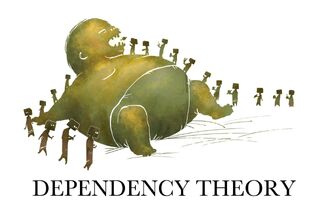
Dependency is associated with the economic development of a nation in terms of political, economic, and cultural influences on its policies. The point of dependency theory is to address mechanisms of national underdevelopment in many cases by examining the patterns of interactions between dominant and inferior states and call to attention that the inequality among nations is at the core of those interactions (Dos Santos). Although there are varied dependency theories for regions and nations all over the world, Latin America serves as a model for dependency theory in multiple 20th century economic studies (Ferraro).
The recurring theme of extraction of goods from a periphery (i.e. Latin America) to an industrialized core began with European colonization, though the US has now taken on a majority of that role. This position was secured through the migration of US corporations to Latin American countries where both the labor and the resources were cheap. Though it is true that they provided jobs for the masses, they did so at the expense of their workers. Latin America, without any refinement infrastructure to produce finished goods, continues to export mass amounts of raw materials and ship them off to developed nations (Bodenheimer). Eventually through trade, Latin America buys the goods made by the developed countries at a higher amount than their profit from selling the raw materials. This mechanism between core and periphery increases their disparity, thus preventing Latin America from establishing an equal economic platform. To put it simply, the industrialized core is playing an unfair game in the international market.
One Latin American norm that has particularly enabled this cyclical economic existance is the extreme prominence of monocultures in Latin America (silver in Potosi, bananas in Guatemala, rubber in Brazil etc.). By investing solely in a single raw material market, that given country has a boom economy for a short period and exports enough to developed powers to bring temporary wealth to their nation. However, the very nature of these monocultures leave their countries in a constant gamble, because no investment in infrastructure or in multiple markets is made to ensure a more stable economy. Yet they are widely supported by US investors who are not seeking to develop or stabilize a long-term economy and create a competitor. ( A prime example of this is the UFCO.)
Since the 1970s dependency theory has fallen largely out of favor with the economic community, but that does not mean that important lessons cannot be learned (Glennie). Although the world economy may no longer be a case of industrialized nations outright economically exploiting the Global South and previously underdeveloped nations are catching up, it may be worth considering the cultural hegemony of industrialized nations and the legacy left in the minds of many Latin American leaders. A lingering desire to be out from under the thumb, so to speak of the United States in particular could be a contributing factor to the current wealth of leaders who are weakening relations with the US and demanding to be treated as equals.
References[]
- Bodenheimer, Susanne. "Dependency and Imperialism: The Roots of Latin American Underdevelopment," in Fann and Hodges, Readings, op. cit., p. 157.
- Dos Santos, Theotonio. "The Structure of Dependence," in K.T. Fann and Donald C. Hodges, eds., Readings in U.S. Imperialism. Boston: Porter Sargent, 1971, p. 226
- Ferraro, Vincent. "Dependency Theory: An Introduction," in the The Development Economics Reader, ed. Giorgi Secondi (London: Routledge, 2008), pp. 58-64.
- Glennie, Jonathan and Nora Hassanaien. "Dependency theory - Is it all over now?" The Guardian. March 1, 2012.